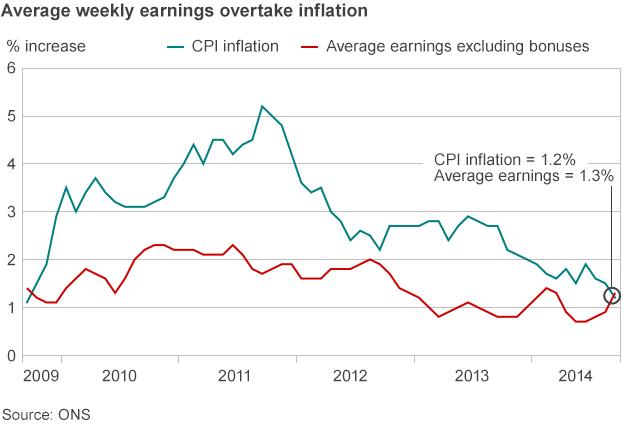Pay growth beats inflation as jobless total falls, ONS says
- Published

Growth in average pay for UK workers overtook inflation for the first time in five years, according to data from the Office for National Statistics.
Wages excluding bonuses rose by 1.3% in the year to September, beating the 1.2% Consumer Prices Index inflation rate.
Including bonuses, earnings rose by 1% from a year earlier, the ONS said, external.
The ONS also said that UK unemployment in the July-to-September period was down 115,000 on the previous quarter, cutting the total to 1.96 million.
Pay has lagged inflation since the global financial crisis, but in recent months earnings have been rising just as the pace of price growth slows.
The government said it showed that the recovery was feeding through to household budgets, but unions said it would be years before earnings returned to pre-crisis levels.
IHS Global Insight's chief UK economist, Howard Archer, said the news on pay would be a relief for consumers.
But he added: "This is still really more to do with low inflation than markedly improving earnings. However, earnings growth did take a much-needed decent step in the right direction in September."
Work and Pensions Secretary Iain Duncan Smith hailed the figures as "remarkable"
Martin Beck, senior economic adviser to the EY Item Club, said: "The surprise rise in pay growth may be in part stemming from signs that the productivity of the workforce is improving.
"While GDP grew by 0.7% in Q3, hours worked rose by only 0.1%. This left the quarterly rise in output per hour at 0.6%, the best performance since the middle of 2011."
The deputy governor of the Bank of England said he expected real earnings to continue outpacing inflation well into next year.
Delivering the Bank's latest inflation report, he said that the inflation rate could fall below 1% next year, while earnings growth would run at around 3%.
'No room for complacency'
The number of people claiming Jobseeker's Allowance was 931,700 in October, 20,400 down on September, and the 24th consecutive monthly cut.
The ONS said employment rose by 112,000 in the latest quarter to 30.7 million, the highest since records began in 1971.
Shadow employment minister Stephen Timms says there is "much more to be done"
Around 14.7% of workers, or 4.5 million, are self-employed, down by 88,000 on the quarter but up by 279,000 on a year ago, while the number of part-time workers wanting a full-time job remained at about 1.3 million.
Employment Minister Esther McVey said: "Record numbers of people in work means more people with the security of a regular wage who are better able to support themselves and their families.
"With the vast majority of the rise in employment over the last year being full-time, it's clear that thanks to the government's long-term economic plan, we are helping businesses to create the jobs that people need."
But Stephen Timms, the shadow employment minister, said there was "no room for complacency". He told the BBC: "Youth and long-term unemployment remain a serious problem, so there is a lot more do."
And Paul Kenny, general secretary of the GMB union, said: "Many of the new jobs are precarious and badly paid while the real value of take-home pay for the rest of the workforce is 13% below pre-recession levels."